| THE FEMALE VOTE | |
September 19, 2000 |
|

|
Presidential candidates Al Gore and George W. Bush have both appeared on Oprah Winfrey's talk show, mainly to attract female voters. After a background report, Gwen Ifill leads a discussion of the campaigns' pitches to women.
|
|
GWEN IFILL: For more on how the gender wars will play this November, we turn to four women who follow the issue: Senator Patty Murray of Washington State is an adviser to the Gore campaign. Representative Jennifer Dunn, also of Washington State, is a Bush campaign adviser. Ruth Mandel is director of the Eagleton Institute of Politics at Rutgers University. And Karlyn Bowman is a resident fellow at the American Enterprise Institute. Welcome everyone. |
|||||||||||||||||||
| The candidates on "women's issues" | ||||||||||||||||||||
|
GWEN IFILL: Congressman Dunn... Congresswoman Dunn, why it is that
women in particular should vote for George W. Bush? REP. JENNIFER DUNN, (R) Washington: Well, I think you got a taste of George W. Bush on television on Oprah today. And he showed qualities of leadership. He showed a great sense of humor. He talked a little bit about his position on issues, and he stressed education, which I believe is very important to all of us who have seen our children through this phase of their life and want to be able to give something great to our children. He wants to localize control in that area. And he also talked a touch about health care, where he wants to give choice to women -- let them keep their OB-GYN, their doctor, but let them be able to have the best health care in the nation. So I think adding that all up, this is a guy you can have confidence in, and who respects women in his life. That's very important to all of us women. GWEN IFILL: Senator Murray, the same question to you for your guy, why is it that women should vote for Al Gore?
GWEN IFILL: Why are those issues considered women's issues? SEN. PATTY MURRAY: Well, you know, I think it's great that women... that the men candidates are really paying attention to the women's issues, because that means that our issues are going to come to the forefront. And you say our issues, women's issues, well, by and large, it's women who take their kids off to school or who go to the doctor with their child and run first-hand into the problems that they're facing. And so these have risen as women's issues, but, in fact, they are men's issues, too. And we are seeing more and more men who are looking at women's issues and making their decisions about who they're going to vote for. REP. JENNIFER DUNN: And, Gwen, I would just add that I think the whole spectrum of issues are women's issues. I don't think we should be limited or demeaned into a position where we're interested in only certain things. Women worry about things at night. When they go to sleep, it's the things they worry about that we ought to be addressing in politics today. And that doesn't leave out the whole area of women who are starting businesses at twice the rate of men and are very worried about tax policy, want to make sure they're not going to be run into the ground by the government taking taxes and cutting them out of an opportunity to start their own business. |
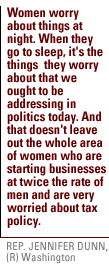 |
|||||||||||||||||||
| The gender gap | ||||||||||||||||||||
|
GWEN IFILL: Ruth Mandel, then how do we explain the gender gap, which always seems to favor women's... often seeming to favor Democratic candidates. In this case Al Gore is benefiting from that - how do we explain that? RUTH MANDEL, Rutgers University: Well, it certainly has to do with
the issues, and the issues that the Senator and the Congresswoman have
I think one other point I just want to... I'd like to make because we talk about women and women of course are all different kinds of women. And the campaigns know that. We know that. There are older women. There are younger women. There are white women. There are women of color - economic differences, education differences. And there are certainly priorities that change and shift among these groups. Nonetheless, the general tendency has been for women to favor the Democrat, and Al Gore seems to have pulled his base of women together since the convention. GWEN IFILL: What's your sense of that, Karlyn? KARLYN BOWMAN, American Enterprise Institute: I agree with Ruth about a number of things. The gender gap is a permanent feature of our politics. It's been with us since the 1980 campaign. We have to look at both sides of the gender gap. Women look a little bit more Democratic. Men look more Republican. And the problem that Al Gore had in the spring and summer of this year is he was especially weak among male voters. He's doing better since the convention, but that's still a problem for the Democrats. GWEN IFILL: That's an interesting point, though. If he's doing... does that outweigh his strength among women voters? KARLYN BOWMAN: Well, women are a larger share of the electorate. Ever since 1980, the rate of voting by men and women has been the same. Women have been participating in slightly higher numbers than men. If you look at the data available to this election, about eight million more women could vote than men but probably about four million more women will turn out than men. GWEN IFILL: I just want to follow up on that. How are the women's issues that we've been talking about, the issues that women respond to, how are they different from what men want to hear? KARLYN BOWMAN: Well, there are some differences that drive GWEN IFILL: Senator, you wanted to say - SEN. PATTY MURRAY: I was going to mention, you said that surprisingly a month-and-a-half ago there wasn't that big of a gender gap and it's changed. That really didn't surprise me because women tend to look at personalities first, and two things happened for Al Gore during the Democratic Convention. One, women saw him as a more personable human being in that, but also, as you get closer to the election women tend to really focus on the issues, and what the specifics of those issues are, and those have fallen in the favor of Al Gore, because his specifics about reducing class size, or making sure that prescription drugs are covered under Medicare, or that you can go to your OB-GYN Are issues women really pay attention to. GWEN IFILL: How about that, Congresswoman? REP. JENNIFER DUNN: Well, I think as we move closer and closer to the election women will get particular about those issues, and when they see the agenda that Vice President Gore is sponsoring, bigger government, more taxes, more mandates from on high. For example, you're on the education board in your local school district and you are required to fulfill mandates that will make education more expensive and not necessarily more effective. I think women are going to change their votes. We have seen a very interesting progression in the vote of women. A month-and-a-half ago, it was very pro Bush -- almost close to even, but pro Bush. And I think we're going to see it move back toward that center as we get closer to the election. GWEN IFILL: Because? REP. JENNIFER DUNN: Because Bush is better on the issues for women. SEN. PATTY MURRAY: Yeah, I would disagree. Having been a former school board member and having local control, but knowing that you need a federal partner in that is something that Al Gore is very good on. And I think for women, they tend to say, "what are you going to do in my child's school?". And I think they're looking for very specifics. And I think that tends to favor Al Gore. REP. JENNIFER DUNN: It doesn't if... If the leader of the nation can
be a great leader like George W. Bush will be as President and can be
|
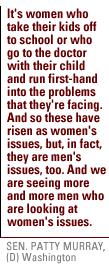 |
|||||||||||||||||||
| Social Security | ||||||||||||||||||||
|
GWEN IFILL: There's another interesting number shows up in these polling
and surveys, which is marital status. Single women are more likely to
support Al Gore. Married women are more likely to support George W.
Bush. What's that about? KARLYN BOWMAN: Marriage gap is also a permanent feature of our politics, and the gap is much larger than the gender gap and has been as long as we've been able to measure it. There's something about marriage tends to... It's tended to pull... married people have tended to be a little bit more Republican than single people, as you suggested. But there's even a gender gap within the married vote. Married women and married men feel differently about issues and candidates. GWEN IFILL: Is there a way, Ruth Mandel, that a candidate can speak to that? RUTH MANDEL: Well, I think that we talked about the segments of the women's vote. I think a very, very important segment of it is the senior citizen vote. And that tends to be heavily women -- many not married because many widows. And they vote in very large numbers at very high rates. So I think that that is going to be where some of the issue appeals come in, certainly for the Democrats on Medicare, on Social Security and so forth.
REP. JENNIFER DUNN: And women retire for longer years on fewer dollars. As the Bush campaign talks about, it's proposal to reform Social Security, they will say, we will keep our promise not to decrease benefits for the nation's seniors, but you married working women who are getting nothing out of Social Security, you pay taxes all those years on your Social Security, and then you get 50 percent of your husband's Social Security, shouldn't you have the right to invest a small portion through a responsible management company? I think you're going to see a great turning on issues toward George Bush as women learn more about him. |
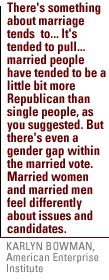 |
|||||||||||||||||||
| The abortion issue | ||||||||||||||||||||
|
GWEN IFILL: Let's talk about the conventional wisdom for a moment because one of the pieces of conventional wisdom which we embrace is that abortion is a big issue with women, yet all... you've all talked for some time now about what the issues are that are driving women voters, and it hasn't come up once. SEN. PATTY MURRAY: I think that does underlie women's vote, too. And it's not just the issue of choice, whether a woman, personally, thinks she may want this policy. It's whether or not she has a government who is going to make decisions for her and her family and that she's not free to make those decisions on her own. And I think that does play into the overall feeling about how they view a candidate.
KARLYN BOWMAN: Looking at polls in the past, abortion is not an issue that has divided men and women. About 10% to 13% of the electorate say it's the most important issue in casting their vote. And, interestingly, that's been a Republican vote, not a Democratic vote -- REP. JENNIFER DUNN: That's right. What we've found -- in the survey research we've done we've found that there's about a 10% group on each end of that abortion policy spectrum who will vote just on that issue. Women's view of government GWEN IFILL: But Patty Murray talked a moment ago about women's view of the role of government in their lives. Does that drive the way women vote, that government should not be in their lives or that government should? SEN. PATTY MURRAY: I think women look at government needing to be there to support what they need and the opportunities they have there. But if they run into a government who says, "I'm not going to give you those kinds of choices," and that's what happens with the abortion issue, then I think, you know, that can change their vote. REP. JENNIFER DUNN: What we've found in our survey - GWEN IFILL: One second, Congresswoman. Just one moment. KARLYN BOWMAN: Women do favor a slightly stronger role for government. I think that's one of the explanations for George Bush's strength in the spring and the summer. He talked about compassionate conservatism and said he was not going to close down the Department of Education and so I think he made enormous strides. Al Gore got the attention at the Democratic Convention, and I think from George Bush's perspective, he needs to get it back. REP. JENNIFER DUNN: But look at the way that George Bush is presenting his tax proposals. I do believe that women want a greater safety net, support for people who can't help themselves and compassionate conservatism is about that. In George Bush's tax proposal, he shifts six million people off the tax rolls; a single woman who has two children and makes up to $30,000 a year is taken off the tax roles so she can begin to work her way up into a good, solid position. GWEN IFILL: But congresswoman, one of the... the numbers we're citing that explain this big swing, gender swing, show the tax issue isn't particularly working with women. REP. JENNIFER DUNN: Well, it is working with women. Women who are focusing on issues as we move closer to the campaign, as Senator Murray said, will begin to notice this. I'll tell you one thing, the victory of having both candidates appear on Oprah is going to be the opening salvo in women's interest. They're so busy balancing all kinds of things -- their interest in this campaign. As we talk about it, that 25-year-old woman who was on the Oprah show today, she's going to begin to understand, she's going to have way up because Bush's tax plan will make sure she keeps it. GWEN IFILL: One last... RUTH MANDEL: I think there are a set of care issues, and women are
in a way not afraid to say, "I need help. I need help around some
of GWEN IFILL: That is going to have to be the last word. That was a great conversation. Thank you all very much. |
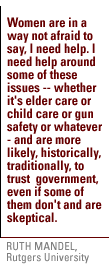 |
|||||||||||||||||||

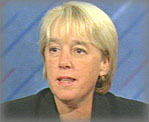 SEN.
PATTY MURRAY, (D) Washington: I think you can look behind just the words
of education or health care and look at the policies -- and I think
that's what women really have done in the last month -- and know that
there are actions behind the words that really mean their kids, their
families are going to have better health care, a better education, that
we're investing in reducing class sizes and bringing new teachers into
our classrooms so that all kids get a chance at a good education, that
a patient bill of right, a real patient bill of rights will pass under
a Gore administration. That means that when you go to the doctor with
your child or with your parent, that you're going to have specific protections.
And I think those issues play very well for Al Gore.
SEN.
PATTY MURRAY, (D) Washington: I think you can look behind just the words
of education or health care and look at the policies -- and I think
that's what women really have done in the last month -- and know that
there are actions behind the words that really mean their kids, their
families are going to have better health care, a better education, that
we're investing in reducing class sizes and bringing new teachers into
our classrooms so that all kids get a chance at a good education, that
a patient bill of right, a real patient bill of rights will pass under
a Gore administration. That means that when you go to the doctor with
your child or with your parent, that you're going to have specific protections.
And I think those issues play very well for Al Gore.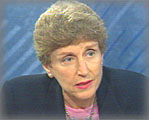 just
talked about are some of the ones being discussed in this campaign most
intensely. But the gender gap was identified 20 years ago now. And the
way it's broken, that is the difference between the way men and women
have been voting, the way it's broken over these 20 years is that women
have tended to vote more in larger numbers for the Democratic candidate.
They've favored the Democratic candidate. And what we saw a few months
ago and earlier into the summer was some polling that indicated that
that didn't seem to be happening this time. And that frankly for those
of us who have been watching for the last 20 years was very puzzling.
What's really happened now in that figure that you... I think it was
37% to 50% is what it's looking like, it's beginning to look a little
bit more like the way the gender gap has been moving. I mean, there
was an 11-point gap for Bill Clinton in the 1996 election. And that
was the largest gender gap ever in a presidential election, but it is
women who elected him and women who were voting Democratic.
just
talked about are some of the ones being discussed in this campaign most
intensely. But the gender gap was identified 20 years ago now. And the
way it's broken, that is the difference between the way men and women
have been voting, the way it's broken over these 20 years is that women
have tended to vote more in larger numbers for the Democratic candidate.
They've favored the Democratic candidate. And what we saw a few months
ago and earlier into the summer was some polling that indicated that
that didn't seem to be happening this time. And that frankly for those
of us who have been watching for the last 20 years was very puzzling.
What's really happened now in that figure that you... I think it was
37% to 50% is what it's looking like, it's beginning to look a little
bit more like the way the gender gap has been moving. I mean, there
was an 11-point gap for Bill Clinton in the 1996 election. And that
was the largest gender gap ever in a presidential election, but it is
women who elected him and women who were voting Democratic.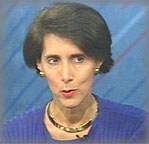 the
gender gap. Women favor a slightly stronger role for government. They
are more risk averse. They're less likely to approve of the use of force,
things like gun control and the death penalty. And they're more concerned
about the country's economy, though they're equally... men and women
are equally positive about their personal futures. So those are the
things that divide the sexes.
the
gender gap. Women favor a slightly stronger role for government. They
are more risk averse. They're less likely to approve of the use of force,
things like gun control and the death penalty. And they're more concerned
about the country's economy, though they're equally... men and women
are equally positive about their personal futures. So those are the
things that divide the sexes.  an inspirer, he can put together those public-private partnerships in
school districts, but there's no reason why when 7 percent of the dollars
for education come from the federal level, over 50 percent of the mandates
should. We have to get rid of that. George Bush wants to do that.
an inspirer, he can put together those public-private partnerships in
school districts, but there's no reason why when 7 percent of the dollars
for education come from the federal level, over 50 percent of the mandates
should. We have to get rid of that. George Bush wants to do that.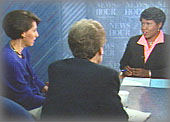
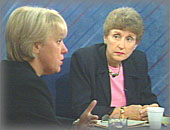 SEN.
PATTY MURRAY: I don't think it's surprising that women in that circumstance
support the Democratic candidate, in this case Al Gore, because they
are so reliant on the federal government, whether it's Social Security
or whatever tax policies are out there, their incomes tend to be much
smaller.
SEN.
PATTY MURRAY: I don't think it's surprising that women in that circumstance
support the Democratic candidate, in this case Al Gore, because they
are so reliant on the federal government, whether it's Social Security
or whatever tax policies are out there, their incomes tend to be much
smaller.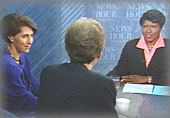 RUTH
MANDEL: In the list of issues so far in this campaign, it doesn't come
up very high when you ask voters, well, what do you care about? What's
very important, what's going to make a difference? Health care certainly
does. All kinds of issues around health care. That's very important
to women as well as education and some other issues. Where I think abortion
will be very interesting to watch is among independent women and among
Republican women who may not decide to vote for... pro-choice Republican
women who may not decide to vote for Al Gore but could possibly decide
not to vote. I think that's going to be an important group.
RUTH
MANDEL: In the list of issues so far in this campaign, it doesn't come
up very high when you ask voters, well, what do you care about? What's
very important, what's going to make a difference? Health care certainly
does. All kinds of issues around health care. That's very important
to women as well as education and some other issues. Where I think abortion
will be very interesting to watch is among independent women and among
Republican women who may not decide to vote for... pro-choice Republican
women who may not decide to vote for Al Gore but could possibly decide
not to vote. I think that's going to be an important group. 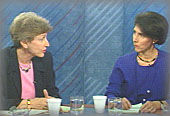 these
issues" -- whether it's elder care or child care or gun safety
or whatever - and are more likely, historically, traditionally, to trust
government, even if some of them don't and are skeptical, are more likely
to trust government than they are the private sector, to be the ones
to turn to for help.
these
issues" -- whether it's elder care or child care or gun safety
or whatever - and are more likely, historically, traditionally, to trust
government, even if some of them don't and are skeptical, are more likely
to trust government than they are the private sector, to be the ones
to turn to for help.